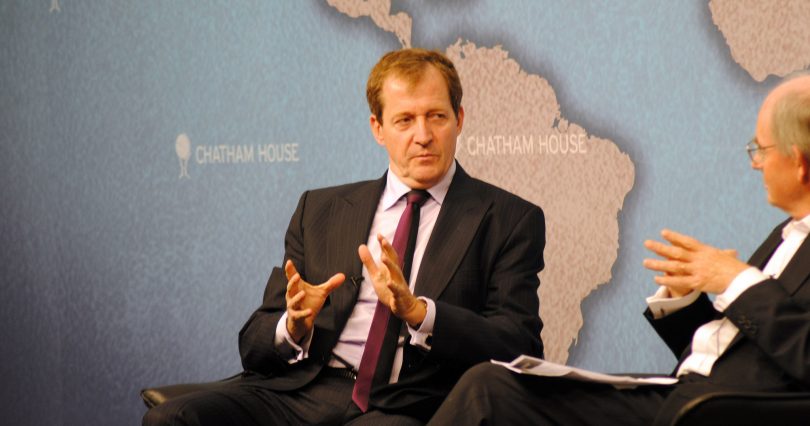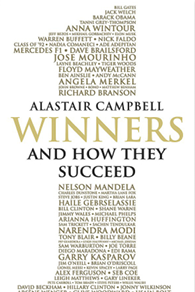An architect of Tony Blair’’s rapid rise to power offers “a celebration of winners—and how we can learn from them.”
Reviewed by Allan Fallow
Alastair Campbell is not one to beat about the bush. Addressing the likely skepticism of American readers early on in his new Winners, he asks rhetorically what we might have to learn from “some Brit who made his name only because he used to hang out with Tony Blair and had someone play him in that movie with Helen Mirren as the Queen?”
Well, give the man this: He knows a thing or two about winners. After serving as the political editor of two British newspapers—Today and The Daily Mirror—Campbell became the chief strategist and official spokesman for Blair from 1994 to 2003, helping Britain’’s Labour Party win three successive elections. Now he’’s out of power but hardly out of the spotlight, having published four volumes of his diaries about the Blair years and six other books, among them a novel (All in the Mind) about his nervous breakdown and recovery from alcoholism in 1986. So if you’’re looking for an authority on focus, resilience and overcoming adversity to achieve success, Alastair Campbell is your chap.
Winners: And How They Succeed is largely an anglocentric work, overflowing with obscure references to “rucks” and “fly halfs” (something to do with rugby, apparently), but in his “Introduction to the American Edition,” Campbell reassures us that Winners is no mere exercise in Euro-stargazing: “”I worry that my own country is somewhat losing the winning mindset,”” he laments. “”We have some great business and sports people and probably more cultural icons per capita than any country on earth, but politically and diplomatically we are in decline, and psychologically and educationally I think we are, too. I think there is a real danger we are lapsing into a mindset prepared to settle for mediocrity. And it gets me down.””
At the Top of Their Game
To counter this deplorable trend, Campbell sets out to visit the winners he admires in sports, business and politics around the world, persuading them to explain both their thinking and their methods so that we lesser-achieving mortals might learn from them. The result may be a celebration of winners, but it is hardly a catalogue of happiness: “”Indeed,”” Campbell warns, ““there are a fair few tortured souls in here.””
One such is Major League Baseball’s Joe Torre, who opened up to the author about his father’’s physical abuse of his mother. ““You blame yourself,”” Torre confessed. “”I think that’’s partly what gave me some of my drive as a player, getting away from that, and proving myself.”” Another tormented soul was Australian athlete Layne Beachley, who lost her “mother” at 7 years old, only to discover later on that she was adopted—and had been conceived during a rape. “That knowledge “awakened something inside me,”” Beachley revealed, ““[and] made me decide, so clearly, that I was going to be a champion at something.”” That something was surfing, and Beachley has now worn its world crown seven times. Campbell has equally affecting (if not quite so revelatory) heart-to-hearts with boxer Floyd Mayweather, whose 47-0 record has made him “the richest athlete on the planet”; Edi Rama, a pro basketball player who became the prime minister of Albania; and Anna Wintour, editor-in-chief of Vogue, who tells him, “”The most important thing is to be decisive and sure and impart that to the people working for you.””
Visualizing Success
With the book running 400 pages and change, no one is about to push Campbell’’s editor into a winner’’s circle. To get the best from this uneven book, flip to Part 2 and read Campbell’’s chapters on “The Extreme Mind” and “The Power of Visualisation.” In the former, hyper-achieving types will find reassurance in the words of no less a winner than Billy Beane, the Oakland A’’s manager whose data-driven analysis of players was canonized in Moneyball. “”The reason all really successful people have to be slightly mad,”” Beane told Campbell, ““is because people like that are not capable of living in the comfort zone. It is a state of mind that makes sure you never rest on your laurels [and] always focus on the next thing.”” Campbell, who wrote and produced the 2008 BBC documentary “Cracking Up” about his own mental illness to destigmatize the disease, concludes from Beane’’s remarks that no one should ever “regard it as a problem that great achievements may involve a degree of mania.”
Campbell is similarly persuasive in his chapter on the “absurdly simple” but “extraordinarily powerful” psychological tool of visualizing what success will look like for you. “Whether the difficult goal is giving a speech, firing someone or training to run a marathon,” Campbell argues, “”there is scarcely a challenge in any sphere of life that cannot be more easily overcome by prior visualization.””
Yet no amount of visualizing could have prepared the soccer-mad Campbell for the afternoon when, at age 49, he received an impromptu invitation to have a “kickabout” with global sensation (and ultimate winner) Diego Maradona: ““It was like asking a teenage boy if he fancied a night out with Jessica Alba.””
You Might Also Like…
Thinking, Fast and Slow
by Daniel Kahneman
[Farrar, Straus and Giroux]
512 pages/$19.23/hardcover
A renowned psychologist and winner of the Nobel Prize in Economics explains the two systems that drive the way we think.
The Power of Habit
by Charles Duhigg
[Random House]
400 pages/$18.97/hardcover
Why habits exist and how they can be changed.
The Organized Mind
by Daniel J. Levitin
[Dutton]
528 pages/$17.10/hardcover
How to navigate the churning flood of information in the 21st century.
Business Adventures
by John Brooks
[Open Road Media]
464 pages/$9.73/paperback
John Brooks, longtime contributor to the The New Yorker, infuses drama and adventure into past stories about corporate and financial life in America — dispensing insight about business that is still relevant today.









